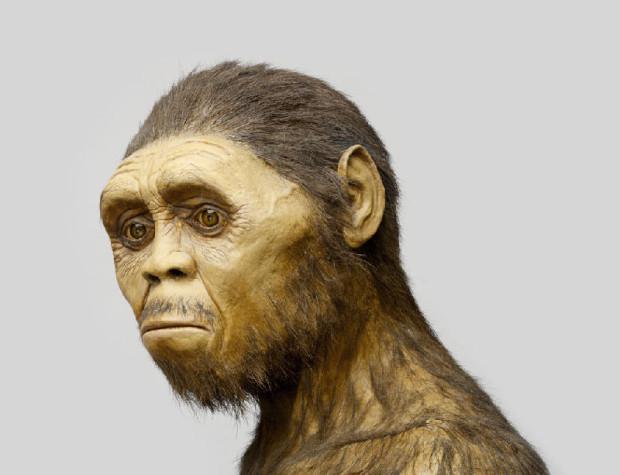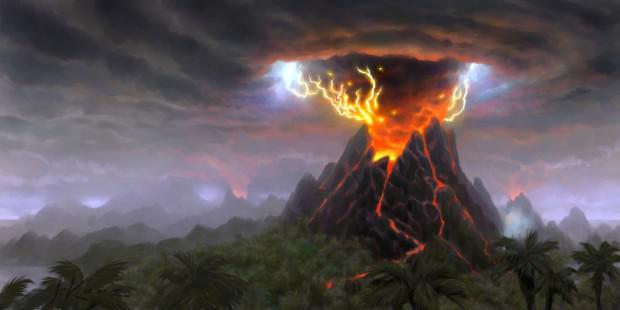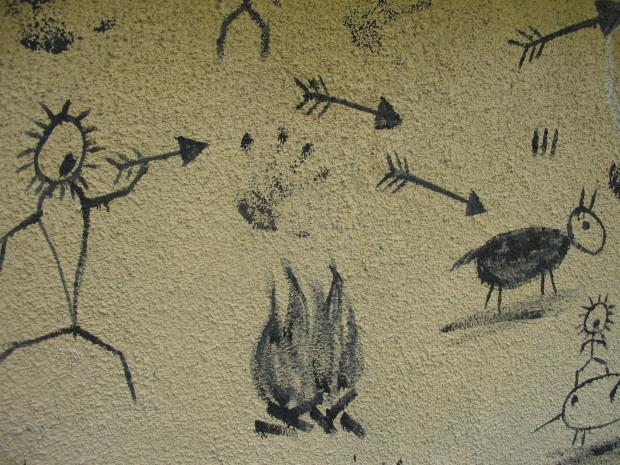8 incredible facts about the evolution of humans
 Bashny.Net
Bashny.Net
Some details about the distant past chelovechestva
Each year, anthropologists make new discoveries, but the question is there more questions than answers, so the learning process is common to humanity "family tree" would probably cease only with the disappearance of our species. Here are some facts that will enable you to learn more about our prehistoric "grandmothers" and "grandfathers».
1. People colonized Europe and Asia long before man razumnogo
Many believe that the ancestors of modern man moved out of the total of "African house" for permanent residence in Europe and Asia about 80 million years ago. However, the first representatives of Homo Sapiens certainly got a nasty surprise - a vast territory had to share with the descendants of Homo Erectus (Homo erectus).
Erectus emerged in East Africa and about 1, 8 million years ago, have begun to actively colonize the European and Asian continents, that is, long before the appearance of Homo sapiens. Externally "bipedal" were very similar to the new arrivals "reasonable" and even mated with them, which is confirmed by data from a study of DNA Asian species Homo Erectus. So our ancestors - not come in large numbers to Europe and Asia some pathetic 80 thousand years ago, Africans, and we can say, the indigenous people of these continents.
2. Genetic diversity of people leaves much luchshego
People - not too different from the genetic point of view of the monkey. Mankind leads descended from a small group of ancient people who lived in East Africa, so a set of genes, passed from generation to generation, over millions of years remains unchanged.
To describe the genetic diversity of species experts use the term effective population size, that is the minimum number of individuals required for the transfer of genetic material in full. For a man this figure is only 15 million, slightly more than 0, 02% of the population of earthlings. For comparison - in some strains of mice effective population size is at 733 x thousand individuals.
3. Our ancestors were neandertaltsy
Careful study of DNA samples taken from Neanderthal remains found, showed that some part of the genome is made available after settling in Europe, the Middle East and Asia. This suggests that Neanderthals and replaced them Cro-Magnons had common children, which then evolved into Homo sapiens.
4. Genetic diversity of people could be much shire
Recent studies have revealed that the genetic diversity of the ancestors of modern man is several times lower than, for example, chimpanzees, gorillas and orangutans, with this difference existed before the appearance of the Neanderthals.
In a dispute about the causes of reducing the diversity of genetic material to scientists disagree: some believe that the blame for the ecological disaster, such as the eruption of the Toba supervolcano, located on the island of Sumatra and is now considered extinct. Others say that small genetic diversity due to inbreeding, frequent sexual relations between members of the same population, have family ties.
Anyway, in human history, probably more than once repeated the story of Noah and the ark - the few representatives of the kind of people surviving in natural disasters, had to take on the mission of restoring the population.
5. The first explorers were more than 50 thousand years nazad
According to anthropologists, the first Homo Sapiens arrived in Australia from Africa about 50 thousand years ago. They had to travel thousands of kilometers across the Indian Ocean restless, being available only primitive boats from bundles of reeds bound together (probably at similar courts ancient explorers traveled from Asia to America about 17,000 years ago).
History, of course, has not kept the names of the brave pioneers, as experienced by them during the relocation of horrors, but the journey is hardly looked like a quiet and nice sea cruise - because they had no maps, no compass, or even confidence, that somewhere ahead of them really waiting for Terra incognita.
6. That which we call "culture" is less than 50 thousand let
Most anthropologists believe that early human ancestors could not imagine that such a "painting", "music" and other forms of art. Many descendants of the so-called mitochondrial Eve (the woman who was the last common ancestor of mankind through the maternal line, lived according to different estimates from 200 thousand to 15 thousand years ago), many thousands of years have been concerned about the creation of simple, purely utilitarian tools, without seeking any -or way of decorating.
The first art appeared about 50 million years ago - it was then that one of the ancient artisans had the idea to put on a weapon or tool design to make it a "beautiful" - from this moment humanity was not only "intelligent", but also " Cultural ».
7. The man became reasonable through fire
The use of fire - one of the main factors of the birth of Homo Sapiens. Now we do not even think how much the fire meant to our ancestors: it significantly raised the standard of living and made it possible to create more sophisticated and durable tools, which led to the further development of the skills of their application and as a consequence - the birth of Homo sapiens. Thus, the very existence of our species, we are required to, inter alia, such a dangerous, but fortunately, a long time ago a man tame "animals" like fire.
8. The evolution of Homo Sapiens continues
Our descendants will probably have to Homo Sapiens is no more common than, for example, we Homo Erectus. Anthropologists say that some parts of the human genome is actively mutate and may in the future spread throughout the population. Many of these mutations affect not only the structural features and organs, but also the properties of the organism such as, for example, disease resistance or tolerance of lactose (carbohydrates contained in milk and milk products).
The experts can not yet say for sure what the nature prepares us, on whom will look like our distant descendants, and what is their level of intelligence, especially since, according to recent research, the brains of people with each generation decreases. Perhaps it does not indicate a decline in mental abilities, and a more rational use of neurons - just as with a decrease in the size of their computer processing power from year to year only increases.
via factroom.ru

Each year, anthropologists make new discoveries, but the question is there more questions than answers, so the learning process is common to humanity "family tree" would probably cease only with the disappearance of our species. Here are some facts that will enable you to learn more about our prehistoric "grandmothers" and "grandfathers».
1. People colonized Europe and Asia long before man razumnogo

Many believe that the ancestors of modern man moved out of the total of "African house" for permanent residence in Europe and Asia about 80 million years ago. However, the first representatives of Homo Sapiens certainly got a nasty surprise - a vast territory had to share with the descendants of Homo Erectus (Homo erectus).
Erectus emerged in East Africa and about 1, 8 million years ago, have begun to actively colonize the European and Asian continents, that is, long before the appearance of Homo sapiens. Externally "bipedal" were very similar to the new arrivals "reasonable" and even mated with them, which is confirmed by data from a study of DNA Asian species Homo Erectus. So our ancestors - not come in large numbers to Europe and Asia some pathetic 80 thousand years ago, Africans, and we can say, the indigenous people of these continents.
2. Genetic diversity of people leaves much luchshego

People - not too different from the genetic point of view of the monkey. Mankind leads descended from a small group of ancient people who lived in East Africa, so a set of genes, passed from generation to generation, over millions of years remains unchanged.
To describe the genetic diversity of species experts use the term effective population size, that is the minimum number of individuals required for the transfer of genetic material in full. For a man this figure is only 15 million, slightly more than 0, 02% of the population of earthlings. For comparison - in some strains of mice effective population size is at 733 x thousand individuals.
3. Our ancestors were neandertaltsy

Careful study of DNA samples taken from Neanderthal remains found, showed that some part of the genome is made available after settling in Europe, the Middle East and Asia. This suggests that Neanderthals and replaced them Cro-Magnons had common children, which then evolved into Homo sapiens.
4. Genetic diversity of people could be much shire

Recent studies have revealed that the genetic diversity of the ancestors of modern man is several times lower than, for example, chimpanzees, gorillas and orangutans, with this difference existed before the appearance of the Neanderthals.
In a dispute about the causes of reducing the diversity of genetic material to scientists disagree: some believe that the blame for the ecological disaster, such as the eruption of the Toba supervolcano, located on the island of Sumatra and is now considered extinct. Others say that small genetic diversity due to inbreeding, frequent sexual relations between members of the same population, have family ties.
Anyway, in human history, probably more than once repeated the story of Noah and the ark - the few representatives of the kind of people surviving in natural disasters, had to take on the mission of restoring the population.
5. The first explorers were more than 50 thousand years nazad

According to anthropologists, the first Homo Sapiens arrived in Australia from Africa about 50 thousand years ago. They had to travel thousands of kilometers across the Indian Ocean restless, being available only primitive boats from bundles of reeds bound together (probably at similar courts ancient explorers traveled from Asia to America about 17,000 years ago).
History, of course, has not kept the names of the brave pioneers, as experienced by them during the relocation of horrors, but the journey is hardly looked like a quiet and nice sea cruise - because they had no maps, no compass, or even confidence, that somewhere ahead of them really waiting for Terra incognita.
6. That which we call "culture" is less than 50 thousand let

Most anthropologists believe that early human ancestors could not imagine that such a "painting", "music" and other forms of art. Many descendants of the so-called mitochondrial Eve (the woman who was the last common ancestor of mankind through the maternal line, lived according to different estimates from 200 thousand to 15 thousand years ago), many thousands of years have been concerned about the creation of simple, purely utilitarian tools, without seeking any -or way of decorating.
The first art appeared about 50 million years ago - it was then that one of the ancient artisans had the idea to put on a weapon or tool design to make it a "beautiful" - from this moment humanity was not only "intelligent", but also " Cultural ».
7. The man became reasonable through fire
The use of fire - one of the main factors of the birth of Homo Sapiens. Now we do not even think how much the fire meant to our ancestors: it significantly raised the standard of living and made it possible to create more sophisticated and durable tools, which led to the further development of the skills of their application and as a consequence - the birth of Homo sapiens. Thus, the very existence of our species, we are required to, inter alia, such a dangerous, but fortunately, a long time ago a man tame "animals" like fire.
8. The evolution of Homo Sapiens continues
Our descendants will probably have to Homo Sapiens is no more common than, for example, we Homo Erectus. Anthropologists say that some parts of the human genome is actively mutate and may in the future spread throughout the population. Many of these mutations affect not only the structural features and organs, but also the properties of the organism such as, for example, disease resistance or tolerance of lactose (carbohydrates contained in milk and milk products).
The experts can not yet say for sure what the nature prepares us, on whom will look like our distant descendants, and what is their level of intelligence, especially since, according to recent research, the brains of people with each generation decreases. Perhaps it does not indicate a decline in mental abilities, and a more rational use of neurons - just as with a decrease in the size of their computer processing power from year to year only increases.
via factroom.ru
Tags
See also
History checkers (in graphics)
5 mysterious stories and simple explanations
The latest article by S. P. Kapitsa. The article is too good to forget it
10 crazy theories about space
Interesting facts about fat people
5 mysterious stories and simple explanations (7 photos)
Isaac Asimov. History has reached a point where humanity is no longer allowed to quarrel
10 facts that prove that the past was worse than we think
Dr. Rijk Hamer: iron law of cancer
10 Books, from which be kinder

















